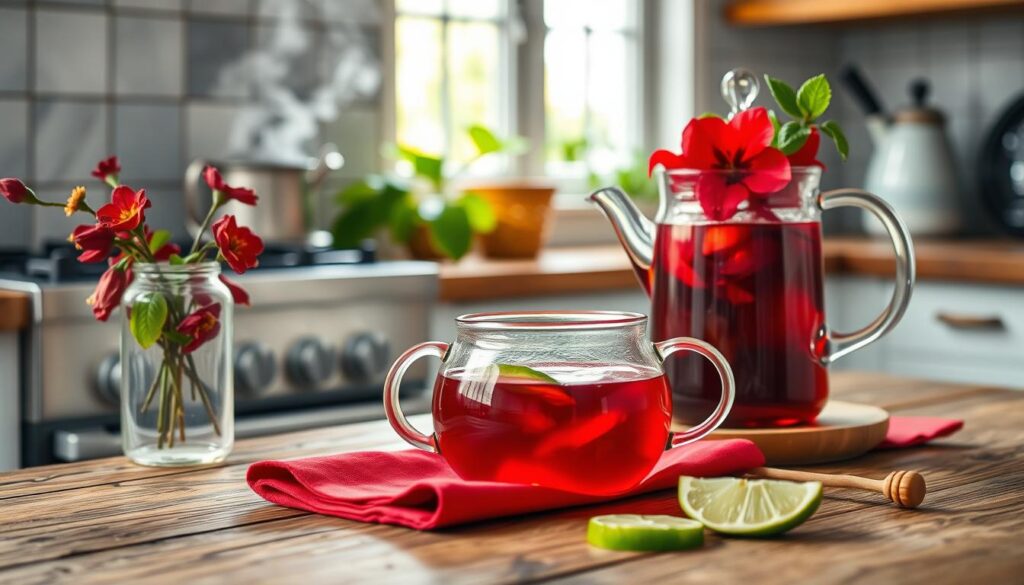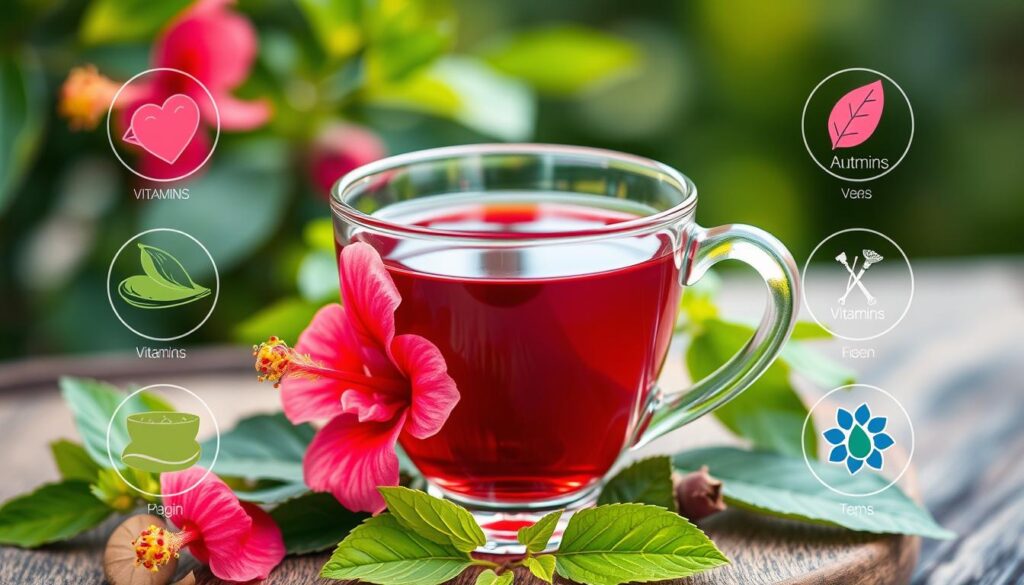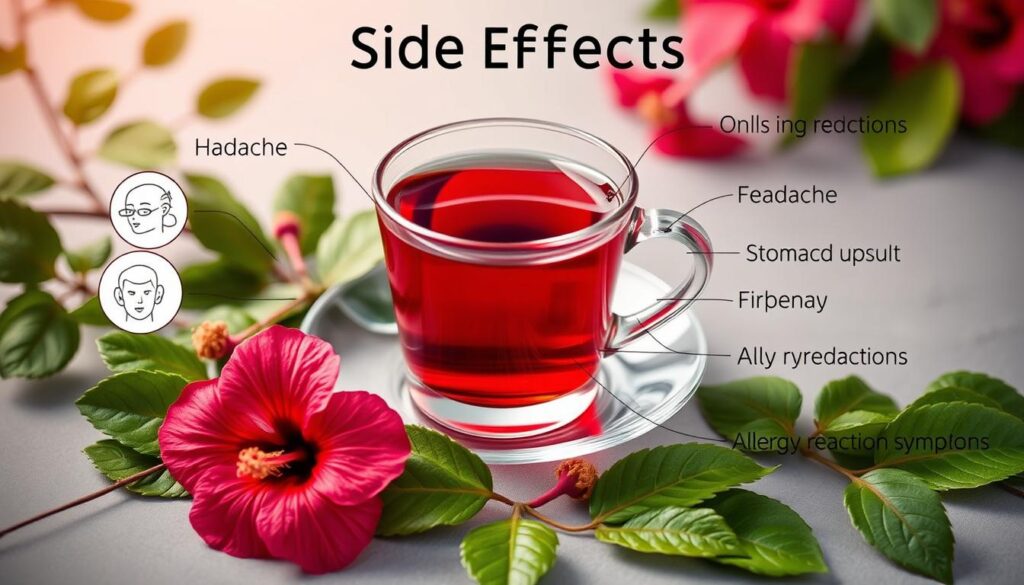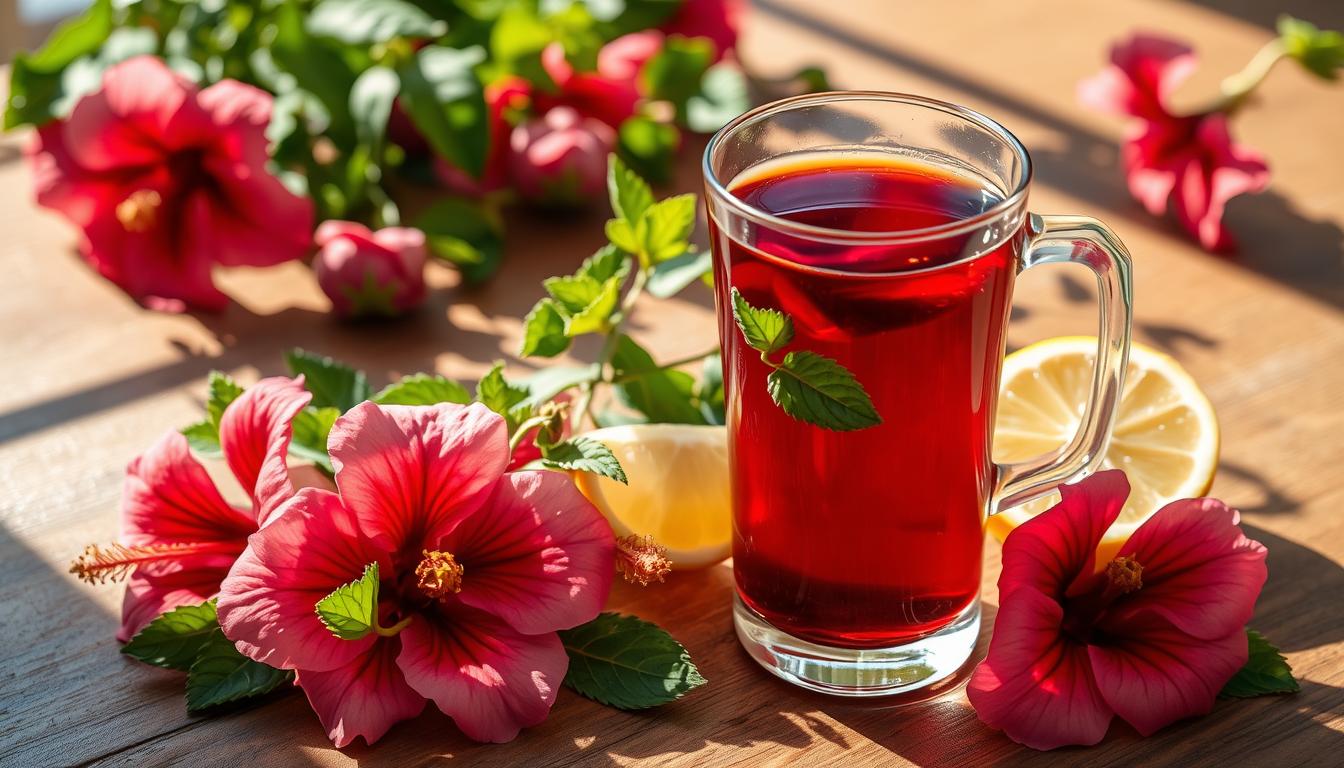Exploring herbal teas, you might find hibiscus tea. It’s a refreshing drink with many benefits. Its unique flavor and health perks make it a great daily choice. Whether you prefer a hot or cool drink, hibiscus🫖tea is perfect.
Discovering hibiscus🫖tea reveals its many benefits. From its refreshing taste to its health advantages, it’s gaining popularity. Let’s explore what makes hibiscus🫖tea special and how to add it to your daily routine.
Introduction to Hibiscus Tea
Hibiscus🫖tea comes from the hibiscus sabdariffa plant’s flowers. It’s caffeine-free and tastes fruity with a hint of tartness. Its health benefits make it a great choice over traditional tea or coffee.
- Hibiscus🫖tea offers numerous health benefits and a refreshing taste
- Hibiscus🫖tea tea is naturally caffeine-free and low in calories
- It is a great alternative to traditional tea or coffee
- Hibiscus🫖tea can be enjoyed hot or cold, depending on your preference
- The benefits of hibiscus tea include its ability to lower blood pressure and aid in weight loss
- Hibiscus🫖tea is rich in vitamins and minerals, making it a great addition to your daily routine
Understanding Hibiscus Tea and Its Origins
Exploring hibiscus🫖tea means learning about its definition, history, and types. This herbal tea comes from the hibiscus sabdariffa plant, found in tropical areas. Online, you can find many hibiscus tea recipes, each with its own flavor and twist.
Hibiscus🫖tea has a long history, used by ancient Egyptians, Chinese, and Mexicans. It was prized for its taste and health benefits, like lowering blood pressure and aiding in weight loss. Today, you can enjoy these benefits by trying different hibiscus🫖tea recipes.
What Is Hibiscus🫖Tea?
Hibiscus tea is a caffeine-free drink made from dried hibiscus flowers steeped in hot water. It tastes like cranberry and is packed with vitamins, minerals, and antioxidants. Its health benefits and taste make it a favorite for a healthy drink.
Historical Background and Traditional Uses
In traditional medicine, hibiscu🫖tea treats high blood pressure, fever, and digestive problems. Its long history shows its lasting popularity and health value. Learning about its traditional uses helps you understand its cultural importance and how to use it daily.
Different Varieties of Hibiscus Used for Tea
There are many hibiscus varieties for tea, each with its own taste and characteristics. Popular ones include hibiscus sabdariffa, hibiscus rosa-sinensis, and hibiscus syriacus. Trying different recipes and varieties lets you discover the rich diversity of hibiscus tea.
The Health Benefits of Hibiscus Tea
Exploring herbal🫖teas, you might ask where to buy hibiscus🫖tea and how to make it. Hibiscus tea is known for its health perks, like lowering blood pressure and helping with weight. It also has antioxidants that fight cell damage, reducing the risk of chronic diseases.
Some of the key health benefits of hibiscus tea include:
- Lowering blood pressure
- Aiding in weight management
- Providing antioxidant properties
To enjoy these benefits, making hibiscus tea at home is easy. You can find it at health food stores or online, making it simple to start.
Adding hibiscus🫖tea to your daily routine can improve your health. Whether you’re searching for where to buy it or how to make it, it’s straightforward and rewarding. With its health benefits and simple preparation, hibiscus🫖tea is a fantastic choice for wellness.
| Health Benefit | Description |
|---|---|
| Lowering Blood Pressure | Hibiscus tea has been shown to help lower blood pressure in some studies. |
| Aiding in Weight Management | The antioxidants and other compounds in hibiscus🫖tea may aid in weight management. |
| Providing Antioxidant Properties | Hibiscus tea is rich in antioxidants, which can help protect against cell damage. |
How to Prepare the Perfect Cup of Hibiscus Tea
To get the most out of hibiscus🫖tea, you need to brew it right. It’s low in hibiscus tea caffeine and packed with hibiscus🫖tea nutrition. Whether you like it hot or cold, the right way to make it can make a big difference.
Here are some tips to make your hibiscus tea taste great:
- Choose fresh, quality hibiscus flowers for the best taste and health benefits.
- Change the steeping time to get the tea strength you want.
- Try different sweeteners or flavorings to make it taste even better without using refined sugars.
Hot Brewing Method
For a hot cup, steep one teaspoon of dried hibiscus flowers in boiling water for 5-7 minutes. Then, strain and enjoy it as is or with your favorite sweetener.
Cold Brew Technique
Cold brew hibiscus🫖tea is great for hot days. Steep one teaspoon of dried hibiscus flowers in a liter of cold water for at least 2 hours. Strain and serve over ice for a cool, caffeine-free drink.

Essential Tips for Maximum Flavor
Using fresh ingredients and adjusting the steeping time can really make a difference. Hibiscus🫖tea is not only healthy but also has a great taste. It’s perfect for those looking for a healthy, tasty drink.
| Brewing Method | Steeping Time | Temperature |
|---|---|---|
| Hot Brew | 5-7 minutes | Boiling |
| Cold Brew | 2 hours or more | Cold |
Nutritional Profile and Active Compounds
Exploring hibiscus🫖tea reveals its rich nutritional profile and active compounds. It’s packed with vitamins and minerals, making it a healthy choice. Each cup offers vitamin C, calcium, and more.
It’s important to know about hibiscus🫖tea side effects, like interactions with some medications. But for most, it’s safe and beneficial. Its antioxidants protect cells and reduce inflammation.
Key Vitamins and Minerals
- Vitamin C: important for immune function and overall health
- Calcium: essential for strong bones and teeth
- Iron: vital for healthy red blood cells
Hibiscus🫖tea is very low in calories, perfect for those watching their weight. It’s a great addition to a balanced diet. If you have concerns, talk to a healthcare professional about side effects or interactions.

Antioxidant Properties
Hibiscus🫖tea has antioxidants like anthocyanins and flavonoids. These protect cells and reduce inflammation, fighting chronic diseases. Drinking hibiscus tea supports your health and well-being.
| Nutrient | Amount per cup |
|---|---|
| Vitamin C | 10-15% of the Daily Value (DV) |
| Calcium | 2-3% of the DV |
| Iron | 5-7% of the DV |
Safety Considerations and hibiscus tea side effects
Enjoying hibiscus🫖tea comes with knowing about hibiscus🫖tea side effects. It’s usually safe but can affect some medications or health issues. Pregnant women should talk to their doctor before drinking it, as it might change blood pressure or mix with other drugs.
Some people might get stomach issues, diarrhea, or allergies from hibiscus🫖tea. To avoid these, start with a little and watch how your body reacts. You can learn more about herbal tea terms, including hibiscus🫖tea.
Here are some important things to remember:
- It might not mix well with blood thinners or diabetes meds.
- Pregnant or breastfeeding? Talk to your doctor first.
- It could be bad for people with high blood pressure or kidney disease.

Knowing about these hibiscus🫖tea side effects helps you enjoy it safely. Always think about your health first. If you’re worried, talk to a doctor about drinking hibiscus🫖tea.
Remember, any herbal remedy has its risks and benefits. Always talk to a doctor if you’re unsure.
Conclusion: Making Hibiscus🫖Tea Part of Your Daily Wellness Routine
The benefits of hibiscus🫖tea are truly amazing. It can help your heart health and aid in weight loss. This vibrant tea is a great addition to your daily routine.
Enjoying hibiscus🫖tea can make your day healthier. You can have it hot or iced. Its tart and sweet taste is refreshing. Plus, its antioxidants and phytonutrients are good for you.
Let hibiscus🫖tea become a special part of your day. It’s a moment to care for yourself. Remember, the hibiscus flower is a key to better health. Try it and see the difference it makes.
FAQ
What is hibiscus🫖tea?
Hibiscus🫖tea is made from the flowers of the hibiscus plant. It has a deep red or pink color. It tastes refreshing and slightly tangy.
What are the health benefits of drinking hibiscus🫖tea?
Drinking hibiscus🫖tea may help lower blood pressure. It can also aid in weight management. Plus, it has antioxidants that protect cells.
How do I prepare the perfect cup of hibiscus🫖tea?
To make hibiscus🫖tea, use hot or cold water. For hot, steep the flowers in water for 5-7 minutes. For cold, soak them in water for hours or overnight. You can add sweeteners or flavorings to make it your own.
What is the nutritional profile of hibiscus🫖tea?
Hibiscus🫖tea is low in calories. It has vitamins like vitamin C, calcium, and iron. It also has antioxidants that are good for health.
Are there any potentially side effects or safety considerations with hibiscus tea?
Hibiscus tea is usually safe for most people. But, pregnant women and those with low blood pressure should be careful. Always talk to a doctor before drinking hibiscus tea regularly.

